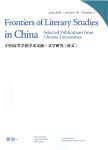Lu Xun and James Joyce: To Heal the Spirit of a Nation
Lu Xun and James Joyce: To Heal the Spirit of a Nation作者机构:School of English Drama and Film University College Dublin Belfield Dublin 4 Ireland Asian Studies Centre Trinity College Dublin the University of Dublin Dublin 2 Ireland Irish Studies Centre School of English and International Relations Beijing Foreign Studies University Beijing 100089 China
出 版 物:《Frontiers of Literary Studies in China-Selected Publications from Chinese Universities》 (中国高等学校学术文摘·文学研究(英文版))
年 卷 期:2016年第10卷第3期
页 面:353-391页
学科分类:0501[文学-中国语言文学] 0303[法学-社会学] 0502[文学-外国语言文学]
主 题:common mission nation paralysis medical model vernacular speech
摘 要:Although James Joyce and Lu Xun were both writing at a time when a new nation was being created out of former empire, little has been written about the extraordinary synchronicities of their early careers or their common mission. Both understood a new nation must first be created in the hearts and minds of its people. Coming from a medical background, each regarded their countrymen as sick in spirit, paralyzed by slavish dependencies. Joyce saw such servility as fostered by Ireland's long colonization under the British Crown, a subservience seconded by the "tyranny" of the Roman Catholic Church. For Lu Xun, this spiritual paralysis manifested itself as a legacy of the Confucianism of the late Qing dynasty. Working from a medical model, both writers present a detailed, precise, and cold account of the speech of their characters to reveal the true nature of their disease--while allowing the reader to reach his own diagnosis. By means of this new kind of narrative, both James Joyce and Lu Xun sought to liberate the "soul" or "spirit" of their people, granting them a voice of their own which itself clarified to what extent they had been conscripted by the words of others.



